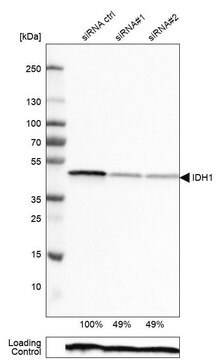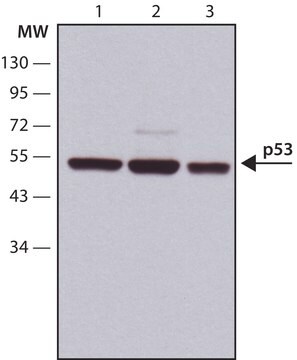SAB4200548
Anti-IDH1 (R132H) antibody, Mouse monoclonal
clone HMab-1, purified from hybridoma cell culture
Synonym(s):
Idh1 R132H Antibody, Idh1 R132H Antibody - Anti-IDH1 (R132H) antibody, Mouse monoclonal, Anti-IDCD, Anti-IDH, Anti-IDP, Anti-IDPC, Anti-Isocitrate dehydrogenase 1 (NADP+), soluble, Anti-NADP(+)-specific ICDH, Anti-NADP-dependent isocitrate dehydrogenase, cytosolic, Anti-NADP-dependent isocitrate dehydrogenase, peroxisomal, Anti-Oxalosuccinate decarboxylase, Anti-PICD
About This Item
Recommended Products
biological source
mouse
Quality Level
conjugate
unconjugated
antibody form
purified immunoglobulin
antibody product type
primary antibodies
clone
HMab-1, monoclonal
form
buffered aqueous solution
mol wt
antigen ~43 kDa
species reactivity
human
concentration
~1.0 mg/mL
technique(s)
western blot: 4.0-8.0 μg/mL using extract of HEK-293T cells overexpressing IDH1R132H.
UniProt accession no.
application(s)
research pathology
shipped in
dry ice
storage temp.
−20°C
target post-translational modification
unmodified
Gene Information
human ... IDH1(3417)
General description
Immunogen
Application
- in immunoblotting
- in immunohistochemistry
- in western blotting
- in cell cycle analysis and apoptosis assays
- in chromatin immunoprecipitation (ChIP) assay
- in in vitro migration assay
Biochem/physiol Actions
Physical form
Disclaimer
Not finding the right product?
Try our Product Selector Tool.
Storage Class Code
10 - Combustible liquids
Flash Point(F)
Not applicable
Flash Point(C)
Not applicable
Certificates of Analysis (COA)
Search for Certificates of Analysis (COA) by entering the products Lot/Batch Number. Lot and Batch Numbers can be found on a product’s label following the words ‘Lot’ or ‘Batch’.
Already Own This Product?
Find documentation for the products that you have recently purchased in the Document Library.
Customers Also Viewed
Our team of scientists has experience in all areas of research including Life Science, Material Science, Chemical Synthesis, Chromatography, Analytical and many others.
Contact Technical Service









